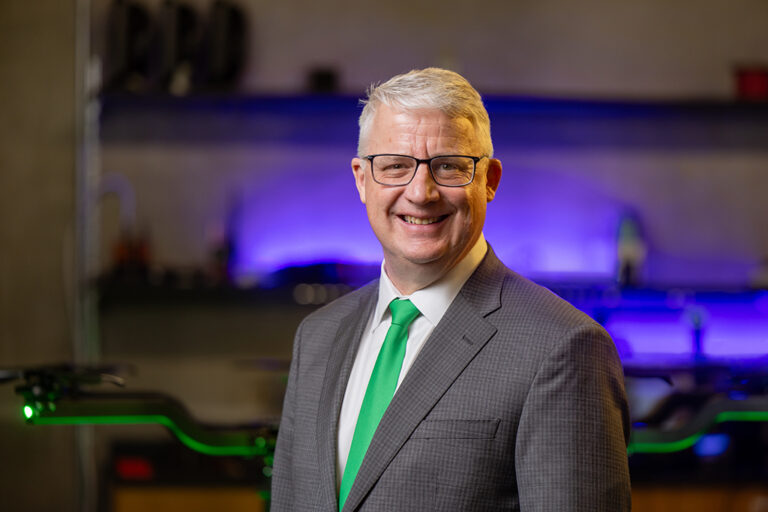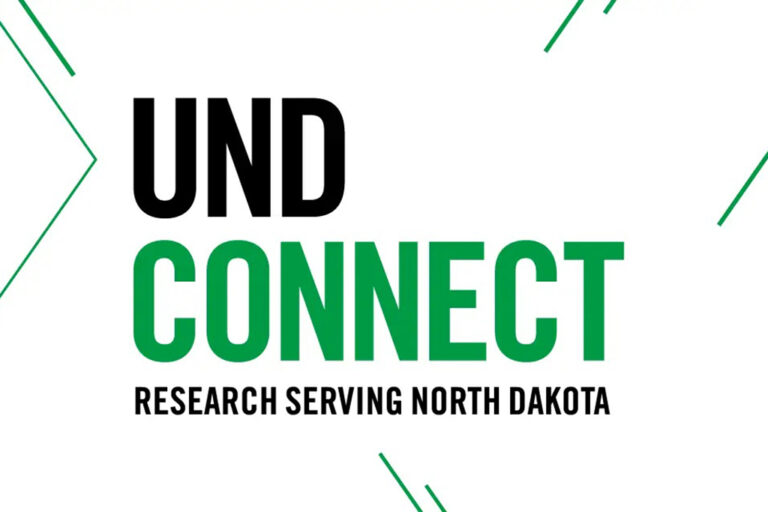UND part of $10.1M national grant package to improve opioid treatment access
Foundation for Opioid Response Efforts funds 19 organization on front lines of opioid crisis
The Foundation for Opioid Response Efforts (FORE), a private, national organization focused on contributing sustainable and scalable solutions to the opioid crisis, recently announced that it is making $10.1 million in grants to 19 organizations across the country, including the University of North Dakota.
These inaugural grants are for projects addressing access to opioid use disorder treatment and services in urban, rural, minority, tribal and low-income communities.

“In 2018, an estimated 130 Americans died every day from an opioid overdose and an estimated 2 million people are currently experiencing opioid use disorder,” said Dr. Andrea Barthwell, chair of FORE’s Board of Directors. “These initial grants focus on improving access to lifesaving treatment. In the months ahead, we will announce additional funding opportunities that address other aspects of this multi-faceted crisis.”
In response to its first request for proposals, FORE received responses from 443 organizations in 46 states. The 19 projects were selected after rigorous review by a panel of 50 independent experts from across the country. They include several projects that are developing or expanding models to better deliver treatment services to adults, adolescents, pregnant or parenting women, justice-involved persons, and uninsured populations. Other funded projects are addressing payment and regulatory policies to increase access to treatment or provide telehealth, mobile, and rural hospital services. In addition, a consortium of leading national organizations is receiving funding for initiatives to improve care delivery in emergency departments across the country.
“Our objective is to identify and fund patient-centered, innovative and evidence-based projects that will expand learning and offer solutions,” said Dr. Karen Scott, M.P.H., president of FORE. “These initial 19 grantees meet that objective. They are strong examples of piloting or expanding innovative approaches for improving access to treatment for populations at high risk of overdose.”
“FORE is committed to determining what works, where it works, and why so that best practices can be disseminated and sustained,” Scott added.
UND’s role
For its part, the University of North Dakota, through the College of Nursing & Professional Disciplines (CNPD), will launch “Don’t Quit the Quit”(DQTQ). “Don’t Quit the Quit” aims to empower pregnant and postpartum women with opioid use disorder who are in recovery, according to Maridee Shogren, a clinical associate professor at the CNPD and coordinator of UND’s FORE related efforts.
Of the 19 FORE grantees, UND is the only one located in the Upper Midwest region of the United States, a demonstration of the University’s regional leadership in the prevention and treatment of opioid addiction.
Shogren said the FORE funding will help UND increase awareness, knowledge and community resources to support the state’s most rural families struggling with the opioid crisis.
“Funding from FORE has arrived at the perfect time,” Shogren said. “There is currently a limited number of providers prescribing Medications for Opioid Use Disorder (MOUD) to address the opioid epidemic and care for women who are pregnant, postpartum and breastfeeding with opioid use disorder and living in the most rural areas of North Dakota.”
FORE also provides UND with an interprofessional opportunity to collaborate with The Heartview Foundation and the North Dakota Women, Infants and Children (WIC) program to encourage women to “Don’t Quit The Quit” in an eight county region in rural North Dakota.
Participants in the “Don’t Quit the Quit” project will also have access to increased education about opioid use disorder during the course of the grant.
Shogren said the “Don’t Quit the Quit” project involves an entire community of practice focused on providing women who are pregnant, postpartum and breastfeeding with opioid use disorder with an expanded network of support. The project aims to increase the number of MOUD providers, who have knowledge of both pregnancy and postpartum care, in addition to opioid use disorder treatment; develop a better educated community that includes WIC providers who work with many mothers and infants during this critical time; and bring innovative supporters like postpartum doulas, whose primary focus is helping mothers and their families assimilate to their new postpartum lives, to rural North Dakota.
Many women who are engaged in treatment for opioid use disorder during pregnancy and postpartum face increased challenges, not only because of their routine prenatal course and postpartum recovery, but because of the continued stigma that surrounds mothers with opioid use disorder.
“The “Don’t Quit The Quit” project supports and encourages mothers to maintain their recovery through these challenges, or in other words, “Don’t quit the hard work they are doing to maintain their healthy life choices and their sobriety,” Shogren said.
National breakdown:
Here’s a breakdown of the other 18 FORE grantees, with their project service areas and title:
NATIONAL INITIATIVES
National Emergency Medicine Consortium
These three organizations are leaders in improving care of patients with opioid use disorder in the emergency department and will work collaboratively to further advance that work across the country.
Meeting Patients at the Front Door—Initiating Opioid Use Disorder Treatment and Recovery in Our Nation’s Emergency Department
‘Get Waivered’ National: Increasing the number of emergency department physicians able to prescribe buprenorphine for treatment of opioid use disorder
- Public Health Institute (National and California)
California Bridge: Emergency Department Medications for Opioid Use Disorder Initiative
National Academy for State Health Policy
- State Policy Center for Opioid Use Disorder Treatment and Access
Rutgers, The State University of New Jersey
- Integrating Medications for Opioid Use Disorder into Primary Care: Innovative Payer and Provider Strategies for Improving Treatment, Engagement, Retention, Outcomes, and Disparities
- Improving Access to the Continuum of Care for Opioid Use Disorder for Low-Income Adolescents and Young Adults
STATE AND LOCAL INITIATIVES
Alabama
University of Alabama at Birmingham
- Strategic Plans to Combat Opioid Use Disorder in the State of Alabama
Alaska
Alaska Native Tribal Health Consortium
- Opioid Use Recovery, Honoring & Empowering Local Providers (OUR HELP)
Illinois
Illinois Association of Free & Charitable Clinics
- Illinois Free and Charitable Clinics Response to Opioid Use Disorder
Maryland and Michigan
- Training Peer Recovery Coaches to Promote Retention and Adherence to Medications for Opioid Use Disorder Among Low-Income Adults
- Treatment with Buprenorphine through Telemedicine in a Rural Criminal Justice Setting
New Hampshire
Foundation for Healthy Communities
- Improving Hospital Inpatient Management of Opioid Use Disorders in Rural Communities
New York
Housing Works (New York City)
- Scaling up a Toolkit to Improve Retention and Adherence in Medications for Opioid Use Disorder Treatment
North Carolina
Mountain Area Health Education Center
- Building Access to Care Through Community Health Centers to Treat Opioid Use Disorder/Establishment of North Carolina Regional Addiction Medicine Programs
University of North Carolina at Chapel Hill – Horizons Program
- Jenna’s Project: Supporting Women’s Re-entry to Society from Prison and Re-connection with Children
Pennsylvania
Allegheny Health Network (Pittsburgh & Western Pennsylvania)
- Mobile Community-Based Engagement and Retention for Persons with Opioid Use Disorder
Thomas Jefferson University (Philadelphia)
- Lowering Barriers, Saving Lives, Reclaiming Health: Integrating Medications for Opioid Use Disorder
West Virginia
- Enhancing and Expanding Medications for Opioid Use Disorder in Southern Appalachia Communities
About FORE:
The Foundation for Opioid Response Efforts (FORE) was founded in 2018 as a private 501(c)(3) national, grant-making foundation focused on addressing the nation’s opioid crisis. FORE is committed to funding a diversity of projects contributing solutions to the crisis at national, state, and community levels. FORE’s mission is to convene and support partners advancing patient-centered, innovative, evidence-based solutions impacting people experiencing opioid use disorder, their families, and their communities.
Source:
Foundation for Opioid Response Efforts
Contact:
Myrna Manners, Manners Dotson Group,
718.986.7255, mmanners@mannersdotson.com


